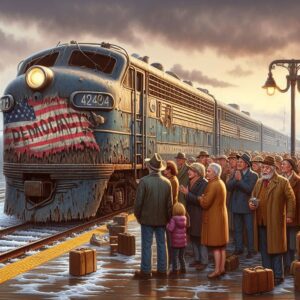The Art of the Raw Deal: A Retrospective on Economic Self-Sabotage

Way back in history, there once was a man—let’s call him The Tariff Whisperer. He had a flair for flamboyant hand gestures, a suspicious tan, and a deep, almost erotic admiration for the word “deal.” He viewed international trade as if it were a blackjack table in Atlantic City and believed you could out-bluff China with a Sharpie and some yelling.
In 2018, this self-styled economic pugilist decided it was time to teach the globe a lesson. No more of this “free trade” nonsense. It was time to slap tariffs on everything that moved, especially if it moved from China. Washing machines? Tax ’em. Solar panels? Why not. Steel and aluminum? Naturally. If it came with a label that wasn’t “Made in the USA,” it got the business end of a punitive import tax.
Farmers, naturally, were thrilled. If by “thrilled” you mean they started Googling how to file for federal bailout checks because China turned around and smacked their soybeans and pork with retaliatory tariffs so fast it made their tractors stall.
This modern economic genius believed he could browbeat the world’s second-largest economy into submission by flailing wildly with tariffs, the same way a drunk uncle tries to win a Thanksgiving argument with volume and vague references to World War II.
Spoiler: it didn’t work. China didn’t surrender. Instead, it played the long game, like it tends to do, retaliating precisely and deliberately. American manufacturers started losing contracts. Midwestern farmers began hemorrhaging income. And consumers? They just paid more for just about everything while being told it was “winning.”
For those who questioned this grand strategy, they were reassured that “trade wars are good, and easy to win.” Ah yes, the kind of confident declaration one typically hears before falling down an open manhole.
Meanwhile, back in the Beltway, the administration doled out tens of billions of dollars in farm subsidies to patch up the self-inflicted wounds. Not socialism, mind you—just patriotic redistribution for political survival. Totally different.
By the time the smoke cleared and the soybeans wilted, the trade deficit hadn’t shrunk, the manufacturing sector had declined, and the only real victory was that a few luxury brands quietly moved production to Vietnam while pretending nothing happened.
So who was this brilliant architect of chaos? Who treated international economics like a reality TV ratings stunt?
Well. Let’s just say he once tried to buy Greenland.


